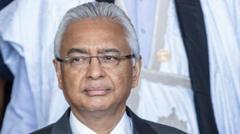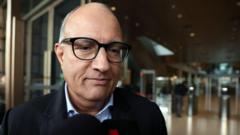In a significant legal ruling, Trafigura and ex-COO Mike Wainwright were found guilty of bribery by Switzerland’s highest court, marking a rare instance of corporate accountability in the commodities sector. The case exemplifies the complexities of off-shore financial practices and may lead to broader implications for the industry.
Landmark Bribery Conviction Shakes Trafigura and Global Commodities Trading

Landmark Bribery Conviction Shakes Trafigura and Global Commodities Trading
Trafigura and former COO Mike Wainwright face unprecedented legal consequences for bribery linked to Angola's oil market.
Switzerland's highest court has set a precedent by convicting the commodities trading powerhouse Trafigura and its former chief operating officer, British national Mike Wainwright, for bribery related to their dealings in Angola's oil market. This landmark ruling resulted in Wainwright receiving a 32-month prison sentence and the company being fined $148 million (£119 million), making it a rare occurrence of corporate accountability in financial crimes.
The case is particularly notable as it is the first time an entire company has been charged by Switzerland's highest court and marks a significant moment in combating corruption within the global commodities trading arena. As Wainwright also has a background in professional racing, the financial thriller elements of the case—featuring millions in questionable payments, intermediaries, and offshore shell corporations—add a unique narrative to the legal proceedings. Prosecutors revealed that Trafigura authorized nearly $5 million (£4.02 million; €4.81 million) in payments to an Angolan state oil company official between 2009 and 2011, leading to lucrative contracts worth approximately $144 million (£115.93 million; €138.56 million).
Despite a robust defense claiming compliance and anti-corruption measures were in place, the weight of evidence presented included a trove of incriminating documents, emails, and memos. The court observed that the organized effort to circumvent these measures, embodied by the anonymous middleman dubbed "Mr. Non-Compliant,” painted a stark contradiction to the firm's proclaimed integrity.
The fallout from this ruling is expected to resonate throughout the commodities sector, particularly in Geneva, an epicenter for many trading houses. The timing was underscored by a coincidental fire at the luxurious Hotel des Bergues, where an Angolan official had previously stayed at Trafigura's expense.
Swiss federal prosecutors aim for this case to symbolize a shift in how corrupt practices are scrutinized and prosecuted. With Wainwright planning to appeal his conviction, he remains free for the time being. The case underlines the potential for increased regulatory scrutiny and the necessity for transparency in an industry often criticized for murky practices and a lack of accountability. As federal authorities step up their efforts, the landmark conviction sends a warning to other players in the commodities market about the changing landscape of corporate governance and legal compliance.



















